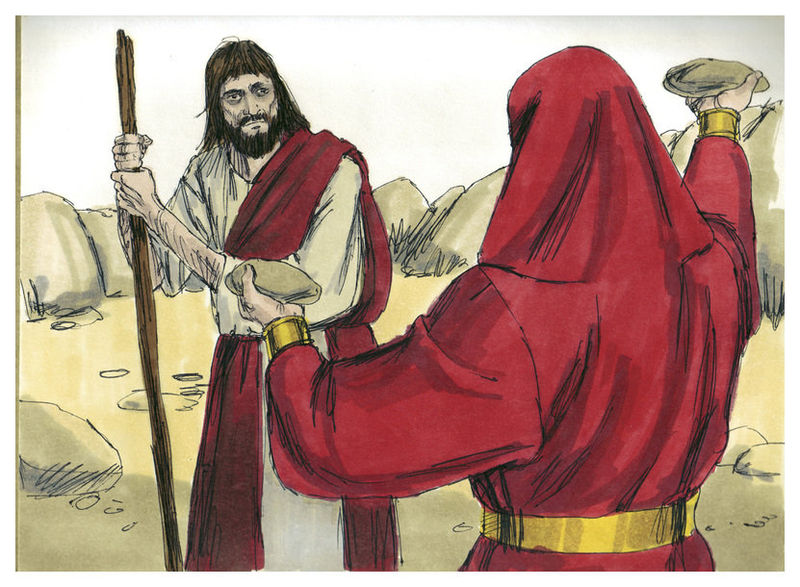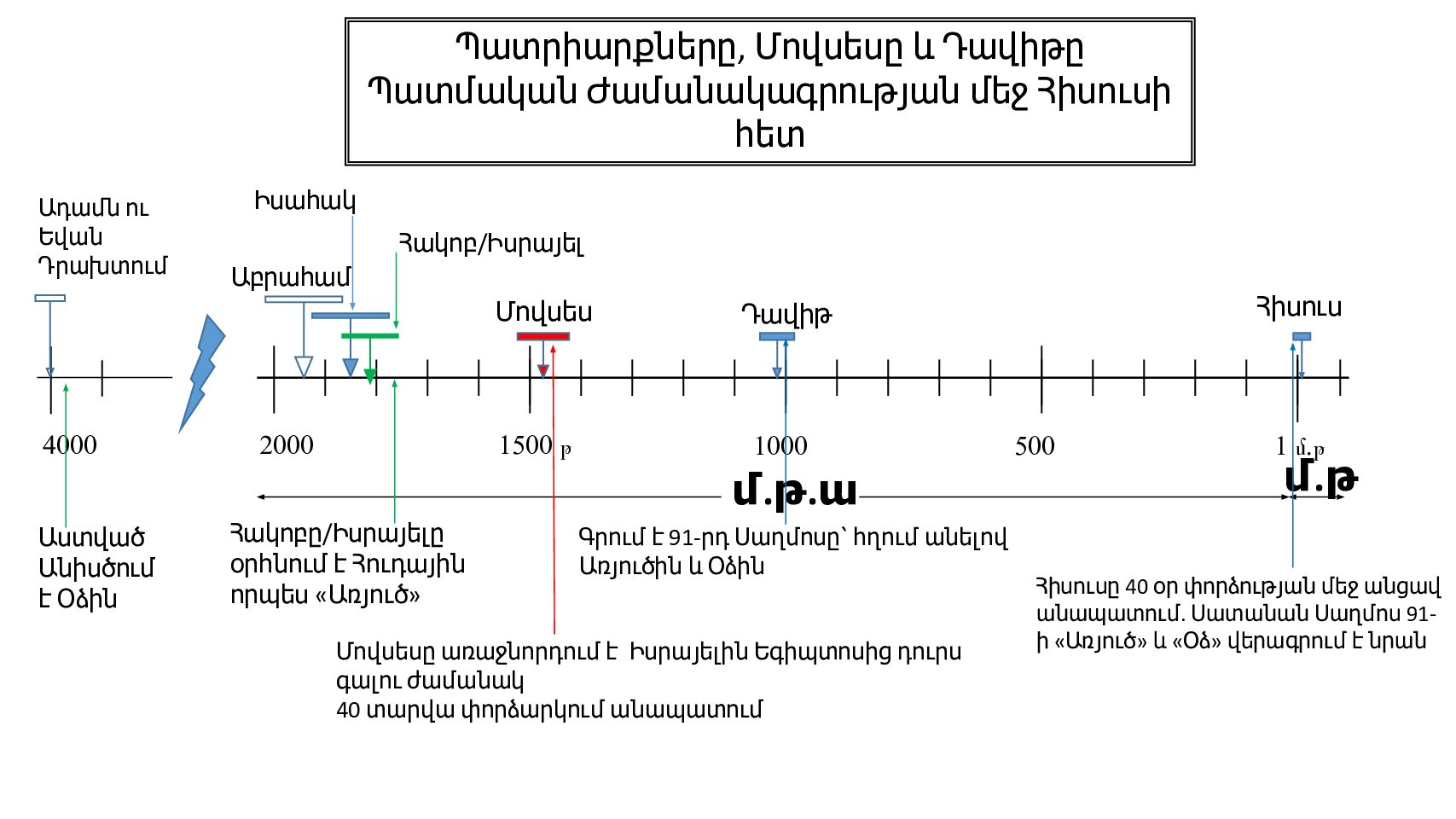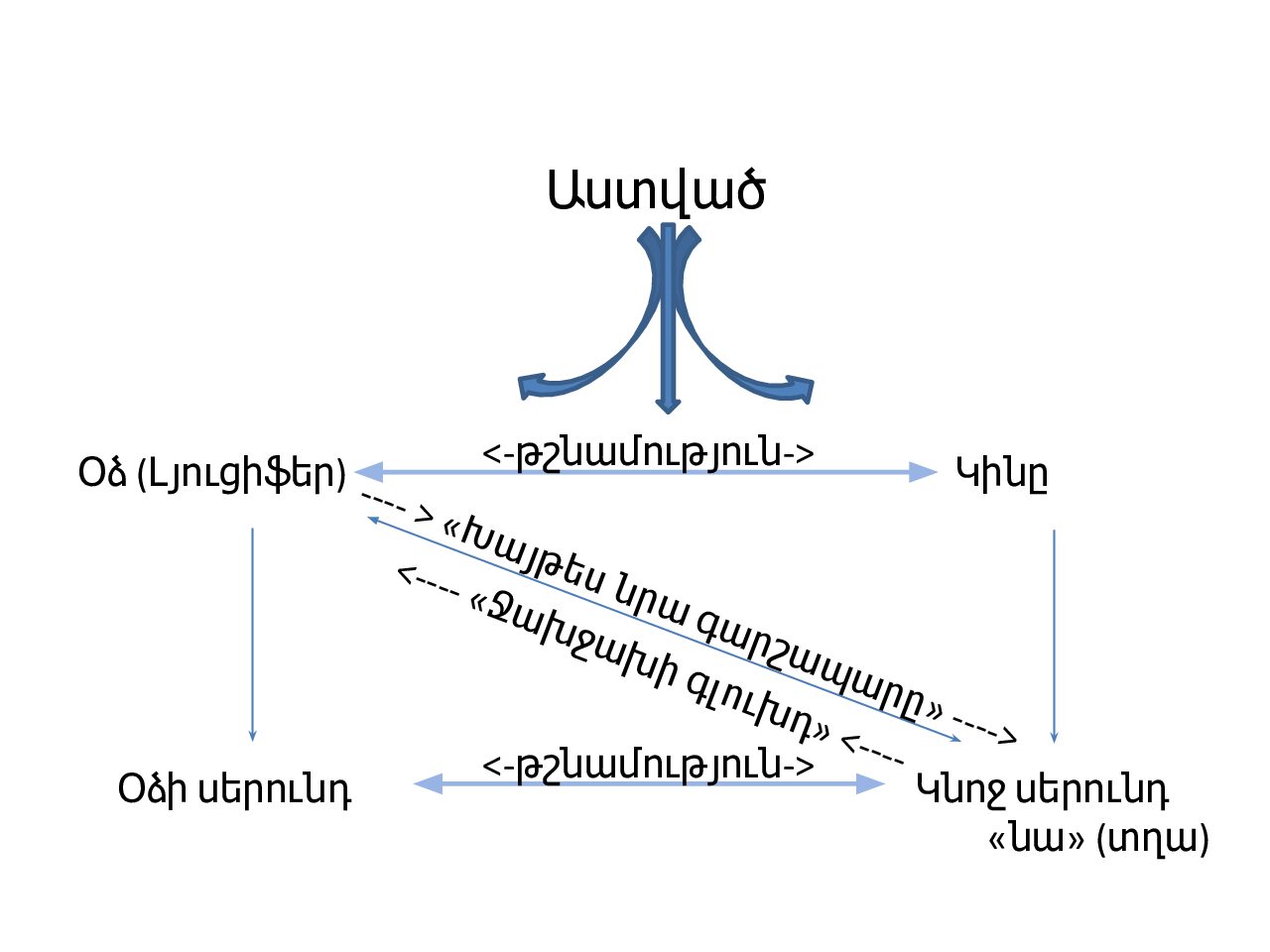
Ավետարանները մեզ պատմում են, որ իր մկրտությունից անմիջապես հետո Հիսուսը…
Եվ իսկույն Հոգին նրան անապատ տարավ։ 13Նա այնտեղ մնաց քառասուն օր և սատանայից փորձության ենթարկվեց. ապրում էր գազանների հետ, ու հրեշտակները ծառայում էին նրան։
Մարկոս 1:12-13
Մեզ կարող է տարօրինակ թվալ, որ Հիսուսը ուղիղ գնաց անապատ փորձելու/գայթակղելու համար։ Եվ ինչո՞ւ 40 օր։ Բայց սա պատահական չէ։ Հիսուսը զարմանալի բան է պնդում սա անելով։ Դա հասկանալու համար մենք պետք է իմանանք Իսրայելի պատմությունը Հիսուսի ժամանակներից 1500 տարի առաջ։
Հիշողություններ Իսրայելի անապատային փորձարություններին

Իսրայելի ծովի անցման ընթացքում մկրտությունից անմիջպես հետո,…
Իսրայելի որդիների ամբողջ բազմությունը մեկնեց Եղիմից և եկավ Սին անապատը, որը գտնվում է Եղիմի և Սինայի միջև, Եգիպտոսի երկրից իրենց դուրս գալու երկրորդ ամսվա տասնհինգերորդ օրը։ 2Իսրայելի որդիների ամբողջ բազմությունն անապատում տրտնջաց Մովսեսի և Ահարոնի դեմ։ 3Իսրայելի որդիներն ասացին նրանց. «Երանի թե Տիրոջ ձեռքով մեռած լինեինք Եգիպտոսի երկրում, երբ մսի կաթսաների մոտ նստած էինք և կուշտ հաց էինք ուտում. որովհետև մեզ բերեցիք այս անապատը, որ այս ամբողջ ժողովրդին սովամահ անեք»։
Ելք 16:1-3
Մկրտությունից անմիջապես հետո նրանք մտան անապատ՝ սովի փորձությանը ենթարկվելու համար։ Եվ նրանք մնացին անապատում 40 տարի։
Տիրոջ բարկությունը բորբոքվեց Իսրայելի դեմ, և քառասուն տարի նրանց թափառել տվեց անապատում, մինչև որ ամբողջապես ոչնչացավ այն սերունդը, որ չարություն էր արել Տիրոջ աչքի առաջ։
Թվեր 32:13
Հիսուսը վերապրում է Իսրայելի փորձությունները՝ նրանք անելով ազգի անունից
Հիսուսը վերստին անցավ այն փորձություններով, որով Իսրայելը անցավ անապատում։ Նրա 40-օրյա փորձությունը անապատում արտացոլում էր Իսրայելի 40-ամյա փորձությունը։ Այսպես անելով՝ նա խորհրդանշականորեն պնդում էր, որ ներկայացնում է Իսրայելին։ Ուշադրություն դարձրեք, թե ինչպես Փորձիչը փորձության ենթարկեց Հիսուսին։
Այդ ժամանակ Հիսուսը Հոգու կողմից անապատ տարվեց՝ սատանայից փորձվելու։ 2Նա քառասուն օր ու քառասուն գիշեր ծոմ պահելուց հետո քաղց զգաց։ 3Եվ փորձիչը, նրան մոտենալով, ասաց. «Եթե Աստծու Որդին ես, ասա՛, որ այս քարերը հաց դառնան»։
4Նա պատասխանեց ու ասաց. «Գրված է. “Ոչ միայն հացով է մարդն ապրում, այլև այն ամեն խոսքով, որ Աստծու բերանից է ելնում”»
Մատթեոս 4:1-4

CC BY-SA 3.0 , Wikimedia Commons-ի միջոցով
Փորձիչը Հիսուսին մկրտությունից անմիջապես հետո, սովի փորձառության մեջ դրեց։ Ինչպե՞ս կվարվեր նա քաղցած վիճակում։ Սա հենց նույն առաջին փորձությունն էր, որի միջով անցավ Իսրայելը։
Երկրորդ գայթակղությունը Աստծո պահպանությունը փորձարկելն էր։
5Այդ ժամանակ սատանան նրան տարավ սուրբ քաղաքը, տաճարի աշտարակի վրա կանգնեցրեց ու նրան ասաց. 6«Եթե Աստծու Որդին ես, քեզ ցա՛ծ նետիր, որովհետև գրված է. “Իր հրեշտակներին քեզ համար պիտի պատվիրի, և նրանք քեզ ձեռքերի վրա պիտի բարձրացնեն, որ երբեք ոտքդ քարին չխփես”»։
«Որովհետև քեզ համար հրամայել է իր հրեշտակներին, որ պահեն քեզ քո բոլոր ճանապարհների մեջ։ Նրանք իրենց ձեռքերի վրա կվերցնեն քեզ, որ քո ոտքը քարի չխփես»։
Սաղմոսններ 91:11-12
7Հիսուսը նրան ասաց. «Դարձյալ գրված է. “Տիրոջը՝ քո Աստծուն, չփորձես”»։
Մատթեոս 4:5-7
Անապատում 40 տարի անցկացնելու ընթացքում Իսրայել ազգը բազմիցս Աստծուն փորձության էր ենթարկել, այդ թվում՝ երբ նրանք փորձության ենթարկեցին Աստծուն՝ Մասսայում իրենց համար ջուր ապահովելու համար, ցանկանալով միս հացի փոխարեն, վախից հրաժարվելով մտնել երկիր։ Որպես Իսրայել՝ Հիսուսը այժմ բախվեց նույն գայթակղությանը, բայց Այս Իսրայելը հաղթահարեց փորձությունը։
Ո՞ւմ նկատի ունի սատանան։
Ուշադրություն դարձրեք, թե ինչպես է սատանան մեջբերում 91-րդ Սաղմոսը՝ Հիսուսին գայթակղելու համար։ Տեսեք ամբողջական հատվածը, որից նա մեջբերել էր միայն մի մասը (որը ընդգծված է)։
Ոչ մի չարիք քեզ չի հասնի,
և ոչ մի պատուհաս չի մոտենա քո վրանին.
11որովհետև նա իր հրեշտակներին կհրամայի քեզ համար,
որ պահպանեն քեզ քո բոլոր ճանապարհներում:
12Նրանք իրենց ձեռքերի վրա քեզ կտանեն,
որ ոտքդ քարի չխփես:
13Առյուծի և կոբրայի վրայով կքայլես,
ոտքերիդ տակ զորեղ առյուծին ու մեծ օձին կկոխկռտես։
Սաղմոսներ 91:10-13
Ուշադրություն դարձրեք, որ այս Սաղմոսը օգտագործում է «դու» դերանունը, որը, ըստ սատանայի, վերաբերում էր «Աստծո Որդուն»։ Սակայն Սաղմոս 91-ում չի ասվում «Աստծո Որդի», ուստի ինչպե՞ս է սատանան եզրակացրել «Աստծո Որդի» բառը Սաղմոս 91-ից։
Առյուծը – Վերադարձ դեպի Հակոբ
Սաղմոս 91-ը հայտարարում է, որ այս «դու»-ն «կկոխկռտեր» «զորեղ առյուծին» և «մեծ օձին» (համար 13): «Առյուծը» վերաբերում է իսրայելացիների Հուդայի ցեղին: Հակոբը ազգի արշալույսին մարգարեացել էր, որ.
Հուդա, քեզ կգովեն քո եղբայրները.
ձեռքդ քո թշնամիների պարանոցի վրա թող լինի,
երկրպագություն անեն քեզ քո հոր որդիները։
9Հուդան առյուծի ձագ է,
որդյա՛կ իմ, կողոպուտից ելար.
ծալեց ծնկները, պառկեց առյուծի պես,
մատակ առյուծի պես. ո՞վ կարթնացնի նրան։
10Չի պակասելու իշխանությունը Հուդայից,
ոչ էլ ղեկավարի ցուպը՝ նրա ոտքերի մեջտեղից, մինչև որ գա Սելովը.
և ժողովուրդների հնազանդությունը նրան կպատկանի։
Ծննդոց 49:8-10
Հակոբը նշել էր, որ Հուդայի ցեղը նման է առյուծի, որից դուրս կգա մի «նա», և որ այս «նա»-ն կիշխի։ Սաղմոս 91-ը շարունակել է այս թեման։ Հայտարարելով, որ «դու»-ն կոտնահարի «առյուծին», Սաղմոս 91-ը ասում է, որ նա կլինի Հուդայի կառավարիչը։

Օձը – Վերադարձ դեպի այգի
Սաղմոս 91-ը, որը մեջբերել է սատանան, նույնպես նշում է, որ նա «կոտխառնի օձին»։ Սա ուղղակի հղում է այգում տրված խոստմանը, որ «կնոջ սերունդը» կջախջախի օձին։ Եկեք այն վերանայենք դիագրամի միջոցով, որը ցույց է տալիս այս խոստման մեջ կերպարներին և նրանց հարաբերությունները։
Այսպիսով, Տեր Աստված ասաց օձին…
Ես թշնամություն եմ դնում քո և կնոջ միջև, քո սերնդի և նրա սերնդի միջև. նա քո գլուխը կջախջախի, իսկ դու կխայթես նրա գարշապարը»։
Ծննդոց 3:15

Այստեղ ավելի մանրամասն քննարկվում է այն Խոստումը, որ Աստված տվել էր այգում, բայց չէր լրացրել մանրամասները։ Հիմա մենք գիտենք, որ «Կինը» Մարիամն է[i], քանի որ նա միակ մարդն էր, ով առանց տղամարդու ուներ ժառանգ՝ նա կույս էր։ Հետևաբար, նրա զավակը՝ խոստացված «նա»-ն, հիմա տեսնում ենք, որ Հիսուսն է։ Հին խոստումը կանխատեսել էր, որ Հիսուսը («նա») կջախջախի օձին։ Սաղմոս 91-ը, որը Սատանան մեջբերել էր Հիսուսին գայթակղելիս, կրկնել էր խոստումը
«Դուք կկոխկռտեք մեծ առյուծին և օձին» (համար 13):
Սատանան մեջբերեց Սաղմոս 91-ը, որն իր հերթին հղում էր կատարում այս երկու նախորդ մարգարեությունների գալիք «նա»-ի մասին, ով կիշխեր և կջախջախեր նաև սատանային։ Այսպիսով, փորձիչը գիտեր, որ Սաղմոսներում իր մեջբերած տողերը վերաբերում էին Աստծո Որդուն (= կառավարչին)։ Սատանան Հիսուսին գայթակղեց, որպեսզի կատարի այս խոստումները սխալ ձևով։ Այս մարգարեությունները կկատարվեին ոչ թե նրանով, որ Հիսուսը տաճարից ցատկեր՝ ուշադրությունը իր վրա հրավիրելու համար, այլ նրանով, որ Հիսուսը կհետևեր նախորդ մարգարեների կողմից բացահայտված ծրագրին։
Երրորդ գայթակղությունը՝ ո՞ւմ երկրպագել:
8Սատանան Հիսուսին դարձյալ տարավ մի շատ բարձր լեռ և նրան ցույց տվեց աշխարհի բոլոր թագավորություններն ու նրանց փառքը։ 9Եվ նրան ասաց. «Այս ամենը քեզ կտամ, եթե առջևս ընկնելով երկրպագես ինձ»։
10Այդ ժամանակ Հիսուսը նրան ասաց. «Հեռո՛ւ գնա, սատանա՛, որովհետև գրված է. “Տիրոջը՝ քո Աստծուն, կերկրպագես ու միայն նրան կպաշտես”»։
11Այդ ժամանակ սատանան նրան թողեց, և ահա հրեշտակներ մոտ եկան ու ծառայում էին նրան։
Մատթեոս 4:8-11
Մինչ Մովսեսը 40 օր Սինա լեռան վրա էր՝ Տասը պատվիրանները ստանալու համար, Իսրայելը սկսեց երկրպագել Ոսկե Հորթին։ Ինչպես պատմում է Աստվածաշունչը։
Ժողովուրդը, տեսնելով, որ Մովսեսն ուշացավ լեռից իջնելու, հավաքվեց Ահարոնի մոտ և ասաց նրան. «Վե՛ր կաց, մեզ համար աստվածնե՛ր շինիր, որպեսզի մեր առջևից գնան. որովհետև այդ մարդը՝ Մովսեսը, որ մեզ դուրս հանեց Եգիպտոսի երկրից, չգիտենք, թե ի՛նչ եղավ»։
Ելք 32:1-2
Այսպիսով, նրանք սկսեցին պատրաստել և երկրպագել Ոսկե Հորթին։ Իսրայելը ձախողվեց նախքան փորձության սկսվելը։ Այս երրորդ գայթակղությանը դիմադրելով՝ Հիսուսը կրկին անդրադարձավ այդ փորձությանը։ Եվ նրա միջոցով Իսրայելը հաղթահարեց փորձությունը։
«Քրիստոս» նշանակում է «օծված» կառավարելու համար, ուստի Հիսուսն իրավունք ունի կառավարելու։ Սատանան գայթակղեց Հիսուսին նրանով, ինչը իրենն էր, բայց Սատանան գայթակղեց նրան, որպեսզի սխալ ճանապարհով գնա դեպի իր կառավարումը, և նա գայթակղում էր Հիսուսին երկրպագել իրեն՝ այն ստանալու համար։ Հիսուսը դիմադրեց Սատանայի գայթակղությանը՝ (կրկին) մեջբերելով Մովսեսին։
Հիսուս՝ մեկը, ով հասկանում է մեզ
Հիսուսի այս գայթակղությունը մեզ համար կարևորագույն նշանակություն ունի։ Աստվածաշունչը Հիսուսի մասին ասում է.
Որովհետև ինչպես որ ինքը չարչարվեց ու փորձվեց, այնպես էլ կարող է օգնել փորձության ենթարկվածներին։
Եբրայեցիներ 2:18
ԵՎ
Որովհետև ոչ թե մի քահանայապետ ունենք, որ չի կարող մեր տկարություններին չարչարակից լինել, այլ մի այնպիսին, որ ամեն բանով փորձված է մեզ նման, բայց առանց մեղքի է։ Ուրեմն նրա շնորհի աթոռին համարձակությամբ մոտենանք, որպեսզի ողորմություն ստանանք ու շնորհ գտնենք մեզ օգնության պատեհ ժամին։
Եբրայեցիներ 4:15-16
Մենք հաճախ ենթադրում ենք, որ կարող ենք հաշտվել Աստծո հետ մեր սեփական արժանիքների շնորհիվ։ Կամ վստահում ենք որևէ կրոնական պաշտոնյայի, որ նա լինի մեր Միջնորդը Աստծո առաջ։ Սակայն Հիսուսը Քահանայապետն է, ով կարեկցում և հասկանում է մեզ։ Նա օգնում է մեզ մեր փորձությունների մեջ հենց այն պատճառով, որ ինքն էլ փորձության է ենթարկվել՝ բայց առանց մեղքի։ Եվ այսպես, մենք կարող ենք վստահություն ունենալ Աստծո առաջ՝ Հիսուսին որպես մեր Քահանայապետ ունենալով, քանի որ նա անցել է ամենադժվար փորձությունների միջով, բայց երբեք չի հանձնվել և մեղք չի գործել։ Նա այն մեկն է, ով հասկանում է մեզ և կարող է օգնել մեզ մեր սեփական փորձությունների և մեղքերի հետ։ Նա միակն է, ով հոգևորապես որակավորված է մեր Քահանան լինելու համար։ Սա հարց է առաջացնում. Արդյո՞ք մենք կթողնենք նրան։
Եզրակացություն
Մենք տեսանք, թե ինչպես էին Հիսուսի գայթակղությունները, ինչպես նրա ծնունդը, մանկության փախուստը և մկրտությունը, նրա Իսրայելի իրականացման պնդումն էր, այսինքն՝ Իսրայելի զարգացումը։ Նրա 40 օրերը անապատում նույնպես նման էին Մովսեսի, առանց սնունդ, 40 օրերին, երբ նա ստացավ Տասը պատվիրանները։ Հիսուսը նման էր Մովսեսին և նաև Իսրայելին։ Մենք ավելի խորությամբ ենք դիտարկում սա, երբ Հիսուսը սկսում է իր ուսուցչական ծառայությունը։ Մենք մեր ուսումնասիրությունն ավարտում ենք այստեղ:
[i] «Կինը» նույնպես վերաբերում է Իսրայելին։ Իսրայելը պատկերված է որպես Աստծո հետ նշանված կին (Եսայի 62։5, Եզեկիել 16։32, Երեմիա 3։20) և այդպես է պատկերված նաև Հայտնություն 12-ում։ Այսպիսով, Ծննդոց 3։15-ում նշված «կնոջ» համար կան երկու հավասարապես վավեր ինքնություններ։